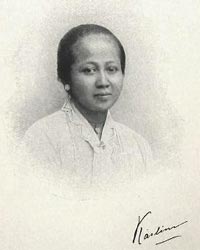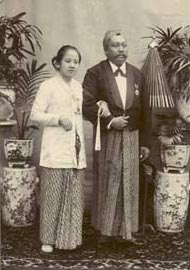|
|
 |
| Home
> Article
> R.A. Kartini, Indonesia’s Leading Feminist
of Women’s Emancipation |
| |
| R.A. Kartini, Indonesia’s
Leading Feminist of Women’s Emancipation |
| |
 |
| |
Raden Ajeng Kartini was a leading
feminist of women emancipation in Indonesia who
was born on 21 April 1879 in Jepara, Central Java.
R.A. Kartini was born to an aristocratic Javanese
family. Her father, Raden Mas Sosroningrat, was
the mayor of Jepara. Her mother, M.A. Ngasirah,
was his father’s first wife. At that time,
polygamy was a common practice among the nobility.
During that period, women received little or no
education at all. Women would end up giving birth
and stay in the kitchen all the time. Kartini rebelled
in her quiet way against this injustice and inspired
the women of her nation to achieve more than what
the society allowed them.
 Kartini went to a Dutch school (Europese
Lagere School) where she learnt to speak
Dutch fluently, which was unusual for Javanese women
at the time. But when she was 12 years old, her
father prohibited her from continuing her studies
because of the tradition. A noble girl was not allowed
to have a higher education; she had to be secluded
at home. This was a common practice among Javanese
nobility, to prepare young girls for their marriage.
The girls were not allowed to go out at all until
they were married, when authority over them was
transferred to their husbands.
Kartini went to a Dutch school (Europese
Lagere School) where she learnt to speak
Dutch fluently, which was unusual for Javanese women
at the time. But when she was 12 years old, her
father prohibited her from continuing her studies
because of the tradition. A noble girl was not allowed
to have a higher education; she had to be secluded
at home. This was a common practice among Javanese
nobility, to prepare young girls for their marriage.
The girls were not allowed to go out at all until
they were married, when authority over them was
transferred to their husbands.
During her seclusion, Kartini's father gave her
certain privileges such as embroidery lessons and
occasional appearances in public for special events.
She learned by herself at home and spent her times
reading books. She was very concerned about women’s
education in Indonesia. From the books, newspapers,
and European magazines that she read, she was very
interested in European women’s way of thinking.
She determined to enhance the education of Indonesian
women. Kartini then established a school especially
for women where she taught how to read and write
as well as other important skills.
Kartini sometimes discussed the issues together
with a Dutch couple, the Ovinks, whom were amazed
with Kartini's fluency in Dutch. Kartini had a book
to read from Mrs. Ovink and started to correspondence
with pen friends in the Netherlands.
One of her pen friends, Rosa Abendanon, was her
close supporter. In her letter, Kartini always discussed
feminist matters and revealed her dream of equality
between men and women in Indonesia. Kartini always
discussed feminist matters and revealed her dream
of equality between men and women in Indonesia.
Later on, Kartini insisted to continue her studies
although her father didn’t approve it. Kartini
then wrote a letter, asking for a scholarship to
study in the Netherlands, to the Education and Culture
Director, Mr. J.H Abendanon, who sent her a very
promising reply.
 However,
Kartini didn’t have a chance to use her scholarship
for her parents married her to the mayor of Rembang
who already had three wives. It was against Kartini's
sensibility but she eventually agreed to please
her ailing father. After the marriage, Kartini followed
her husband, Raden Adipati Joyodiningrat, to Rembang,
Central Java. However,
Kartini didn’t have a chance to use her scholarship
for her parents married her to the mayor of Rembang
who already had three wives. It was against Kartini's
sensibility but she eventually agreed to please
her ailing father. After the marriage, Kartini followed
her husband, Raden Adipati Joyodiningrat, to Rembang,
Central Java.
In Rembang, Kartini continued her correspondence
with her pen friends in The Netherlands. Supported
by her husband, Kartini established a school for
women in complex area of Rembang District Office.
Kartini gave birth to her only son, RM Soesalit,
on 13 September 1904. Unfortunately, Kartini passed
away several days later on 17 September 1904 at
the age of 25. She was buried in Bulu Village, Rembang.
Following Kartini’s death, Mr. J.H Abendanon
published a book called “Door Duisternis Tot
Licht” (Through Darkness
to Light) which consists of the collection
of Kartini’s letters to her friends in Netherlands.
To honor Kartini’s effort, a school for women
was built by Kartini Foundation in Semarang in 1912,
which was followed by a number of schools in Surabaya,
Yogyakarta, Malang, Madiun, Cirebon, and others.
In 1964, President Soekarno stated Kartini as Indonesian
Heroine and set Kartini’s birthday, 21 April,
as the Indonesia National Day (Kartini's
Day). |
| |
| Back
to other articles |
| |
|
 |
|
|
